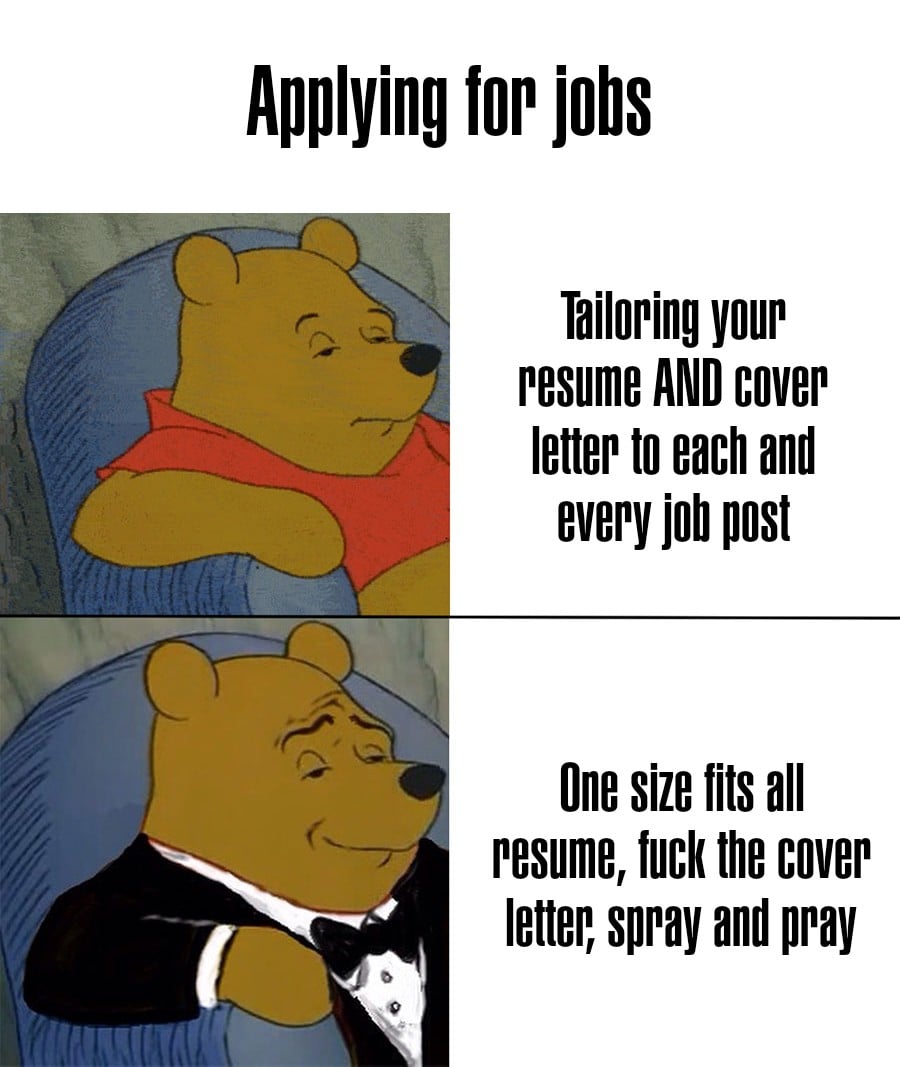this post was submitted on 21 Nov 2024
1145 points (98.8% liked)
memes
14864 readers
5451 users here now
Community rules
1. Be civil
No trolling, bigotry or other insulting / annoying behaviour
2. No politics
This is non-politics community. For political memes please go to [email protected]
3. No recent reposts
Check for reposts when posting a meme, you can only repost after 1 month
4. No bots
No bots without the express approval of the mods or the admins
5. No Spam/Ads
No advertisements or spam. This is an instance rule and the only way to live.
A collection of some classic Lemmy memes for your enjoyment
Sister communities
- [email protected] : Star Trek memes, chat and shitposts
- [email protected] : Lemmy Shitposts, anything and everything goes.
- [email protected] : Linux themed memes
- [email protected] : for those who love comic stories.
founded 2 years ago
MODERATORS
you are viewing a single comment's thread
view the rest of the comments
view the rest of the comments

I think cover letters are still absolutely relevant to the job process.
I liken cover letters to cheat sheets that you prepare for an exam. You may not need to make one to be successful, but can be very helpful.
Usually with cover letters, I try to make the argument that I'm good for the company, and the company is good for me. This usually allows me to frame the way I look a new job as a business agreement where both parties can benefit, and that I'm not a parasite taking from them and not giving.
I don't make cover letters for each and every position I apply to or look into, but for those ones i think I have a good chance of landing and those companies I believe in, I'll absolutely put in more effort with cover letters.
Interesting. I'm a hiring manager, and I've seen many cover letters that actually hurt the candidate because they have typographical errors, poor grammar, or are addressed to a different organization entirely. Probably 85% of cover letters I see do no harm; most of the rest hurt the candidate. The way you're describing a cover letter sounds like it would be beneficial, but I don't see ones like that very often. I definitely would appreciate that you took the time to tailor it to us.
My advice for everyone is, if you're going to write a cover letter, proofread it just like the resume. If you're short on time, focus on the resume and skip the cover letter (if you can - they might be required for some applications). I definitely notice a sloppy cover letter, so not having a cover letter will hurt far, far less than a sloppy one.
I wouldn't toss someone's application just because their cover letter had a typographical error in it, especially if the candidate is otherwise well qualified. But, if I'm borderline on whether I want to interview someone, and the cover letter is sloppy, I'm probably going to pass. We're pretty detail-oriented, and a sloppy cover letter makes me worry about the details.
To me, I don't understand why someone would proofread their resume but not their cover letter.
Then again, I'd be someone that would put in the same degree of effort to the resume as the cover letter. Not everyone is like that.
Guess it just depends on if you find it worthwhile or not. If you can't seem to land jobs following interview after interview, it might be worthwhile to look into cover letters if only to help you orient yourself better to the job and company.
Yeah, I hear that...but you'd be surprised at how often I see perfectly-rendered resumes, and then multiple obvious issues in a cover letter.
The cover letter helps you get the interview - after I make the decision (offer or not), I pretty much forget about the cover letter.
Nobody in my industry bothers to read them. You'd be lucky if they spend more than a minute on the resume so they're a waste of time.
Some organizations in my industry require them, so guess it depends.
Regardless of if it's required, however, I would still argue that it's good even if you don't have to send it to the company. To me, it helps me put my head in the right mindspace to argue for myself and make a case that I'm the person for them.
Is your industry the 1950s?
My industry is STEM?
Why are you asking me? Also, that's not an industry.
I couldn't count the number of people I've interviewed, but I can tell you that I've read exactly zero cover letters.
Again, part of my argument in favor of cover letters is that they help the candidate better prepare for the (sometimes multiple) interview process. They can help a candidate distill the main reasons as to why they want the job, which can make conversation easier if you're more comfortable speaking to those more personal things.
Again, the candidate can keep that to themselves.
Nope.
Great dialogue!
You're welcome.